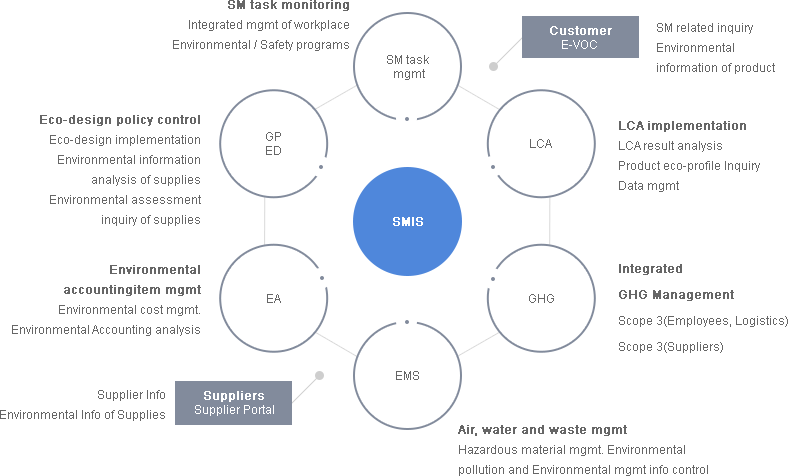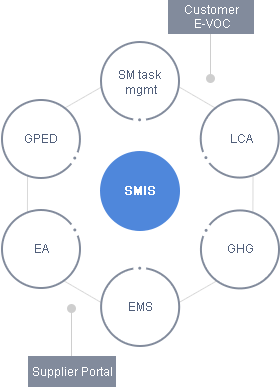Sustainability Management Initiative System
Samsung SDI developed the world-first integrated information system for sustainability management. The system, Sustainability Management Initiative System (SMIS), is designed to proactively respond to global environmental regulations. The system is composed of four product-related modules - green purchase/eco-design(GP/ED), lifecycle management assessment(LCA), environmental accounting(EA), GHG management (GHG) - and of one management related module (SM project management).
* The Environmental Management System (EMS) module has been transferred to the G-EHS (Safety Environment System).


-
SM task mgmt
- SM task monitoring Integrated mgmt of workplace Environmental / Safety programs
-
GPED
-
Eco-design policy control
Eco-design implementation
Environmental information analysis of supplies
Environmental assessment inquiry of supplies
-
Eco-design policy control
Eco-design implementation
-
EA
-
Environmental accounting item mgmt
Environmental cost mgmt.
Environmental accounting analysis
-
Environmental accounting item mgmt
Environmental cost mgmt.
-
GHG
- Integrated GHG Management Scope 3(Employees, Logistics)Scope 3(Suppliers)
-
LCA
- LCA implementation LCA result analysis Product eco-profile Inquiry Data mgmt
EA is a system to support cost-benefit analysis of environmental investments, aimed at reduction of the environmental impact of corporate management activities. Samsung SDI applies EA to implement environmental accounting analysis companywide, sharing necessary data regarding SAP or investment system and analyzing the data by site. Samsung SDI plans to set up environmental accounting guidelines to consistently improve the level of environmental accounting.
GP/ED is composed of GP and EP. GP enables to manage S-partners and assess parts’ environmental data and their eco-friendliness, while ED supports eco-design. Aligned with BOM data, the module enables to respond to customers’ request for product environmental information immediately. It enables recycling rate analysis for all parts and products. Environmental information management of parts at source becomes possible as PLM (Product Lifecycle Management) and Green purchasing menu of SRM (supplier's portal)
In the future, all Samsung SDI products should go through eco-design (product design review: Q, C, D+E) ahead of mass production. Eco-design assessment items are categorized into resources, energy, and harmfulness, and relevant business divisions manage low-level assessment items.
LCA quantifies material consumption and generation, energy use, and emission throughout the life cycle of a product; and analyzes the eco-friendliness of the product. It provides eco-profile of each product. Samsung SDI improved the e-Energy system, linked the LCA module with utility allocation of each process, and collected basic LCA data of parts from suppliers. Then we have adopted Hybrid LCA using IO(Input-Output) LCA for upstream, and original process LCA for internal process. LCA module can analyze energy/emission status and CO2 generation by product group. If it is linked to GP/ED, we can perform a time series analysis for the monthly recycling rate assessment. All products Samsung SDI produces automatically generate Hybrid LCA scores. We will continue to collect part LCA information to enable full process LCA in the near future as well.
Samsung SDI has developed a system for monitoring both direct/ indirection emissions during the manufacturing process and GHG emissions across all its business activities (Scope 3). Our efforts will continue to reduce GHG emissions across all business operations by measuring and managing GHG emissions from our suppliers, logistics, domestic and overseas transportation, and employee commuting and business travels.
SM task management is a monitoring system for SM project progress and status check by department/ strategy code. It enables consolidated management even for ISO 14001 and OHSAS 18001 programs. Tasks are based on a total of ten SM strategies divided into environmental and social aspects.











